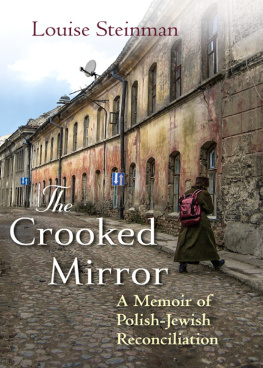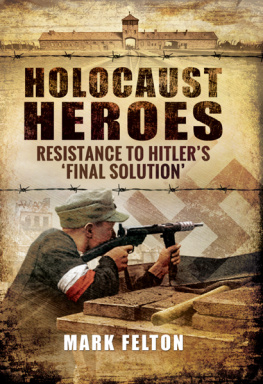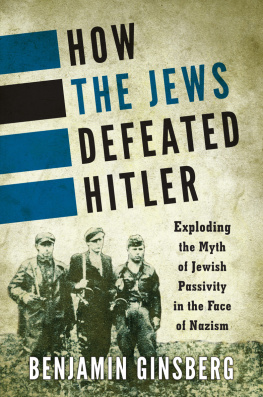RESISTANCE
NECHAMA TEC
RESISTANCE
Jews and Christians Who Defied the Nazi Terror


Oxford University Press is a department of the University of Oxford. It furthers the Universitys objective of excellence in research, scholarship, and education by publishing worldwide.
Oxford New York
Auckland Cape Town Dar es Salaam Hong Kong Karachi
Kuala Lumpur Madrid Melbourne Mexico City Nairobi
New Delhi Shanghai Taipei Toronto
With offices in
Argentina Austria Brazil Chile Czech Republic France Greece
Guatemala Hungary Italy Japan Poland Portugal Singapore
South Korea Switzerland Thailand Turkey Ukraine Vietnam
Oxford is a registered trademark of Oxford University Press in the UK and certain other countries.
Published in the United States of America by
Oxford University Press
198 Madison Avenue, New York, NY 10016
Nechama Tec 2013
All rights reserved. No part of this publication may be reproduced, stored in a retrieval system, or transmitted, in any form or by any means, without the prior permission in writing of Oxford University Press, or as expressly permitted by law, by license, or under terms agreed with the appropriate reproduction rights organization. Inquiries concerning reproduction outside the scope of the above should be sent to the Rights Department, Oxford University Press, at the address above.
You must not circulate this work in any other form and you must impose this same condition on any acquirer.
Library of Congress Cataloging-in-Publication Data
Tec, Nechama, author.
Resistance : Jews and Christians who defied the Nazi terror/Nechama Tec.
pages ; cm
Includes bibliographical references and index.
ISBN 9780199735419
1. World War, 19391945Jewish resistancePoland. 2. World War, 19391945Underground movementsPoland. 3. Holocaust, Jewish (19391945)Poland. 4. PolandHistoryOccupation, 19391945. I. Title.
D810.J4T426 2013
940.53438dc23
2012041864
1 3 5 7 9 8 6 4 2
Printed in the United States of America on acid-free paper
To my husband, Dr. Leon Tec, who encouraged me to write and never to stop.
Introduction
At the Edge of Nowhere
I came to the study of resistance indirectly, through my long involvement with Holocaust research and teaching. As a frequent lecturer on the subject of German policies of Jewish annihilation, I have always been eager to take audience questions. The more challenging the queries, the more I welcome them. And precisely because I look forward to questions and the discussions they stimulate, I became puzzled that certain queries made me feel uncomfortable and even resentful. Invariably the questions were variations of the following: Why didnt the Jews strike back at their oppressors? Why did the Jews submit so passively to the German assaults upon their dignity and their lives? Why did the Jews refuse to fight? Woven into the fabric of these queries was the clich that Jews went like sheep to their slaughter. At bottom, the questions involved Jewish resistance during World War II, in which scholarly interest grew during the 1960s and has continued to this day. However, nearly a half-century of exploration of this topic has still let stand, unchallenged, a myth.
It crossed my mind that these troubling questions might have been fueled by ignorance. Yet, rather than make an effort to fill the implicit gaps in knowledge behind them, I dismissed the questions as rhetorical. Those who posed them did not seem to expect answers. Each contained unsubstantiated claims but also implicit assumptions. One was that the opportunities to resist were present, but that Jews simply failed to take advantage of them, and since the Jews took no advantage of such opportunities, they themselves were partly to blame for what happened to them. In a roundabout way then, assumptions about Jewish passivity led to the conclusion that Jews had become collaborators in their own destruction. This idea effectively absolves the perpetrators of the responsibilities for the crimes they had committed against the Jewish people.
Similar kinds of blame the victim accusations have been leveled against a variety of others. Usually, however, they appear within the context of discussions about racism, sexism, slavery, and, of course, anti-Semitism.
Throughout history a wide range of accusationssometimes concealed innocently as complaintshave been directed at the Jews. If only they would stop dressing in conspicuous ways, no one would bother them. If only they were not so greedy, manipulative, and loud, they would be fine. If only Jews were not communists, capitalists, and religious fanatics. The list seems endless, particularly when presented by anti-Semites. History shows how pernicious this mindset was and the tragic consequences it had.
My interest in Jewish resistance during the Holocaust grew out of these persistent queries. Discussions about Jewish resistance are burdened by their close association to queries such as these, presented as facts, but in reality driven by unsubstantiated assumptions. Similar to them are assertions about Jewish complicity. They continue to surface in current debates. As I delved into these issues, I became convinced that neither these assumptions, nor their implications, could be settled during a question-and-answer session. They needed to be clarified through systematic, comparative examinations of historical facts. This project sets out to do just that. In addition, it explores some of the contextual sources connected to queries, assumptions, accusations, and counteraccusations. The results could be of value to Holocaust scholars, but they are also intended to address those questions from the audience about Jewish and non-Jewish resistance, in particular.
At the end of the war, conspicuously absent was any attention to Jewish resistance. Similarly, Jews as a category of victims did not even appear in the many postwar court deliberations. In 194546, at the International Military Tribunal the Jews were not discussed as a distinct entity. Also, at the subsequent Nuremberg Trials (194748), they were not considered as a special category of victims. Jews appeared only in individual documents and only when specific charges were made against the German occupation.
By the 1950s and beyond, historians who had examined the destruction of European Jewry concentrated on the perpetrators rather than the victims. Later on, when attention was paid to these victims, they were identified simply as Jews. There was little if any discussion about the different fates of Jews, nor any particularsage, sex, or nationality. This inattention should not come as a surprise, given that the enormity of the German crimes overshadowed their victims. Perhaps, too, it should not come as a surprise that early historians of that period were primarily interested in learning about the forces that caused such unprecedented destruction. Only after the basic outlines of the processes of Jewish annihilation had been explored did scholars begin to notice the less visible parts to the puzzle, namely, the different categories and subcategories of victims.
And that included Jews who tried to resist the annihilation. Under the German occupation, continuous oppression and targeted abuses of diverse local populations was met by three distinct reactions: submission, resistance, and collaboration. Each of these responses varied with time, place, and specific populations. Submission was the most common reaction. Resistance was the exception. Severe German retaliations limited resistance activities of the conquered majorities. However, the threat of retaliation did not affect the majorities resentments toward their occupiers. Passive or not, they saw the mere existence of organized opposition among them as a validation of that resentment.
Next page









